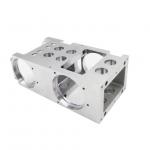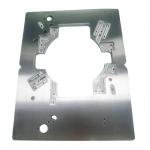Precision machining for the medical sector, often referred to as
precision medical machining, is a critical process in the
production of high-accuracy components essential for medical
devices and applications. This advanced manufacturing technique
ensures that medical components meet the stringent requirements of
the healthcare industry, where precision, reliability, and quality
are non-negotiable. This article explores the significance of
precision machining in the medical sector, its applications, and
its role in advancing healthcare technology.
| Drilling, Etching,Chemical Machining, Laser MachiningMilling, Other
Machining Service, Turning, Wire EDM,Rapid Prototyping | | Aluminum, Brass, Bronze, Copper, Hardened Metal, Pre-cious Metal,
Stainless Steel, Steel Alloy | | CNC Machining,CNC Turning, CNC Milling, CNC Boring,CNC Grinding,CNC
Drilling | | Anodizing,Plating,Polishing,Sandblasting,Laser Engraving,Oxide
Black,Nickel Plating,Chrome Plat Or Customer's Requirements | | +/-0.01mm | | Sample: 7 days | | 2-3 weeks | | Standard Carton Or Plastic Tray, Sponge Tray, CardboardTray, etc.,
Can Be Customized According To CustomerRequirements | | Appliance,Auto, Building, Capital equipment,
Energy,Instrumentation,Medical device.Telecommunications |
The Importance of Precision Machining for Medical Applications The medical sector demands components that are not only precise but
also biocompatible, durable, and capable of performing under
stringent conditions. Precision machining for medical applications
involves creating intricate parts for surgical instruments,
implants, diagnostic equipment, and other medical devices.
Techniques such as CNC machining, micro-machining, and Swiss
machining are employed to achieve the tight tolerances and complex
geometries required for these components.
Precision Medical Machining: Meeting the Demands of Healthcare Precision medical machining is a specialized area of precision
machining tailored to the unique needs of the medical industry.
This process involves working with materials such as titanium,
stainless steel, and medical-grade plastics to produce components
that are both functional and safe for use in the human body.
Precision medical machining is used to create parts like orthopedic
implants, dental instruments, and cardiovascular devices, ensuring
that each component meets the highest standards of quality and
performance. Applications of Precision Machining in the Medical Sector Precision machining is used to produce a wide range of medical
components, including: Surgical Instruments: Scalpels, forceps, and clamps require precise machining to
ensure accuracy and reliability during procedures. Implants: Orthopedic screws, joint replacements, and dental implants
must be machined to exact specifications to ensure proper fit and
function. Diagnostic Equipment: Components for MRI machines, CT scanners, and ultrasound
devices rely on precision machining for optimal performance. Medical Devices: Insulin pumps, pacemakers, and prosthetics are examples of
devices that depend on precision-machined parts for their
functionality.
Advantages of Precision Machining for the Medical Sector The advantages of precision machining for the medical sector
include: High Accuracy: Ensures components meet exact specifications and tolerances. Complex Geometries: Enables the production of intricate designs that are
difficult to achieve with traditional methods. Material Versatility: Supports a wide range of materials, including biocompatible
metals and plastics. Quality and Reliability: Produces components that meet the highest standards of safety
and performance.
The Role of Technology in Precision Medical Machining Technological advancements have revolutionized precision medical
machining, making it possible to achieve unprecedented levels of
accuracy and efficiency. CNC machines, multi-axis systems, and
advanced software allow for the production of highly complex
components with minimal human intervention. These technologies also
enable rapid prototyping and customization, ensuring that even the
most demanding medical requirements can be met.
FAQ: 1.How can I get CNC parts sample?
Yes, just need sample cost, we will return it back in mass
production.
We also provide free samples in special conditions.
2.How about the lead time?
It depends on quantity, generally 7-20 days after order
confirmation.
3.Can you give me help if my products are very urgent?
Yes, we will try our best to give you help. Because we have our own
factory to produce. We can flexible to adjust our production
schedule. |









